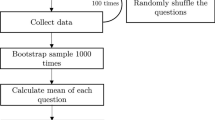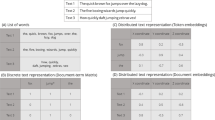Abstract
The form and meaning of the English progressive have received a great deal of attention in linguistic and corpus-linguistic literature. The pragmatic/discourse uses of the progressive, however, are much less comprehensively understood from a corpus-linguistic perspective, largely because of the limitations of machine reading of discourse contexts. This paper uses a corpus-linguistic approach to categorizing and counting the distributions of some pragmatic functions for the English present and past progressive, replicating some, but challenging other, results of prior analyses of the progressive. Specifically, we address the use of the progressive in prompt/response sequences, in referring to co-text and its extent of agreement or disagreement with that co-text, in providing narrative background, and in interpreting prior discourse. We also provide several semantic features summarized through the corpus. The analyzed data comes from a corpus of 12.2 million words of spoken data—interviews from U.S. television and radio programs—and are selected via a systematic method. We finally discuss pedagogical and other implications.















Similar content being viewed by others
Notes
We are strongly indebted to an anonymous reviewer for emphasizing this point and encouraging us to investigate interpretative use.
These calculations include the pro-form “doing”.
References
Anderwald, L. (2016). I’m loving it—Marketing ploy or language change in progress? Studia Neophilologica. https://doi.org/10.1080/00393274.2016.1208536.
Batstone, R. (1995). Grammar in discourse: Attitude and deniability. In G. Cook & B. Seidlhofer (Eds.), Principle & practice in applied linguistics: Studies in honour of H.G. Widdowson (pp. 197–214). Oxford: Oxford University Press.
Bhimji, F. (2001). Retrieving talk from the simple past and the present progressive on alternative radio. Journal of Pragmatics, 33, 545–569.
Biber, D., Johansson, S., Leech, G., Conrad, S., & Finegan, E. (1999). Longman grammar of spoken and written English. Essex: Pearson Education Limited.
Boogaart, R. (2007). The past and perfect of epistemic modals. In L. de Saussure, J. Moeschler, & G. Puskás (Eds.), Recent advances in the syntax and semantics of tense, aspect and modality (pp. 47–69). Berlin: de Gruyter Mouton.
Boogaart, R., & Trnavac, R. (2011). Imperfective aspect and epistemic modality. In A. Patard & F. Brisard (Eds.), Tense, aspect, and epistemic modality (pp. 217–248). Amsterdam: John Benjamins.
Bu, J. (2016). A semantic study of tense backshift and its literary effects in FID. Journal of Literary Semantics, 45(1), 49–75. https://doi.org/10.1515/jls-2016-0004.
Bybee, J., Perkins, R., & Pagliuca, W. (1994). The evolution of grammar: Tense, aspect, and modality in the languages of the world. Chicago: University of Chicago Press.
Carter, R., & McCarthy, M. (2017). Spoken grammar: Where are we and where are we going? Applied Linguistics, 38(1), 1–20. https://doi.org/10.1093/applin/amu080.
Collins, L. (2007). L1 differences and L2 similarities: Teaching verb tenses in English. ELT Journal, 61(4), 295–303. https://doi.org/10.1093/elt/ccm048.
Collins, P., & Yao, X. (2014). Grammatical change in the verb phrase in Australian English: A corpus-based study. Australian Journal of Linguistics, 34(4), 506–523. https://doi.org/10.1080/07268602.2014.929087.
Comrie, B. (1976). Aspect. Cambridge: Cambridge University Press.
Fleischman, S. (1995). Imperfective and irrealis. In J. Bybee & S. Fleischman (Eds.), Modality in grammar and discourse (pp. 519–551). Amsterdam: John Benjamins.
Higginbotham, J. (2004). The English progressive. In J. Guerón & J. Lecarme (Eds.), The syntax of time (pp. 329–358). Cambridge, MA: The MIT Press.
Hinkel, E. (2013). Research findings on teaching grammar for academic writing. English Teaching, 68(4), 3–21.
Huddleston, R., & Pullum, G. K. (2002). The Cambridge grammar of the English language. Cambridge: University Press.
Kesner Bland, S. (1988). The present progressive in discourse: Grammar versus usage revisited. TESOL Quarterly, 22(1), 53–68.
Kranich, S. (2010). The progressive in modern English: A corpus-based study of grammaticalization and related changes. Amsterdam: Rodopi.
Kranich, S. (2013). Functional layering and the English progressive. Linguistics, 51(1), 1–32. https://doi.org/10.1515/ling-2013-0001.
Larsen-Freeman, D., & Celce-Murcia, M. (2016). The grammar book: Form, meaning, and use for English language teachers. Boston, MA: National Geographic Learning.
Leech, G. (1971). Meaning and the English verb. London: Longman.
Levinson, S. (1983). Pragmatics. Cambridge: Cambridge University Press.
Ljung, M. (1980). Reflections on the English progressive. Göteborg: Acta Universitatis Gothoburgensis.
Manning, C., Surdeanu, M., Bauer, J., Finkel, J., Bethard, S. J., & McCloskey, D. (2014). The Stanford CoreNLP natural language processing toolkit. In Proceedings of 52nd annual meeting of the association for computational linguistics: System demonstrations (pp. 55–60).
Quirk, R., Greenbaum, S., Leech, G., & Svartvik, J. (1985). A comprehensive grammar of the English language. Essex: Pearson.
Römer, U. (2005). Progressives, patterns, pedagogy: A corpus-driven approach to English progressive forms, functions, contexts and didactics. Amsterdam: John Benjamins.
Sacks, H., Schegloff, E. A., & Jefferson, G. (1974). A simplest systematics for the organization of turn-taking for conversation. Language, 50(4), 696–735.
Schegloff, E. A. (2007). Sequence organization in interaction: A primer in conversation analysis. Cambridge: Cambridge University Press.
Stange, U. (2016). I was sat there talking all night: A corpus-based study on factors governing intra-dialectal variation in British English. English Language and Linguistics, 20(3), 511–531. https://doi.org/10.1017/S1360674316000319.
Author information
Authors and Affiliations
Corresponding author
Ethics declarations
Conflict of interest
On behalf of all authors, the corresponding author states that there is no conflict of interest.
Additional information
Publisher's Note
Springer Nature remains neutral with regard to jurisdictional claims in published maps and institutional affiliations.
Rights and permissions
About this article
Cite this article
Frazier, S., Koo, H. The Use of the English Progressive Form in Discourse: An Analysis of a Corpus of Interview Data. Corpus Pragmatics 3, 145–171 (2019). https://doi.org/10.1007/s41701-018-00050-9
Received:
Accepted:
Published:
Issue Date:
DOI: https://doi.org/10.1007/s41701-018-00050-9




